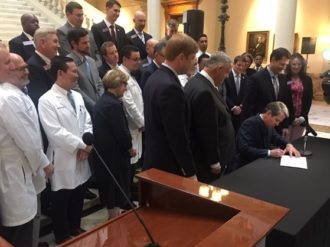Story updated
Despite objections from hospital groups, Gov. Brian Kemp’s administration has stuck to its tough financial transparency rules for nonprofit hospitals.
The board of the Department of Community Health, meeting in Atlanta on Thursday, gave final approval to new financial requirements that hospitals must follow, including disclosing top salaries, property holdings and business ventures.

State health officials, though, deferred an expected board vote on Kemp’s waiver proposal that would add people to the state’s Medicaid rolls. Blake Fulenwider, chief health policy officer for Community Health, said the state needs to catalogue and analyze more public comments that were submitted recently.
He told GHN that most public comments have called for Medicaid expansion under the Affordable Care Act, a step that Georgia Republican leaders have long opposed. Such an expansion, Fulenwider said, is precluded by the language in the legislation passed by the General Assembly this year.
And state officials at the meeting gave an update on the flooding crisis at Atlanta’s Grady Memorial Hospital, which has led the safety-net facility to divert ambulances to other hospitals.
Top salaries, properties targeted
The financial disclosure rules, passed by the General Assembly, have caused consternation among large nonprofit hospitals. The requirements are intended to help consumers make an informed decision in selecting a hospital.
Groups such as the Georgia Hospital Association, the Georgia Alliance of Community Hospitals and Navicent Health raised questions about the phrasing of provisions in the law, which industry officials characterized as vague and difficult to interpret.
But Ryan Loke, chief health care policy adviser to Kemp, told GHN that the objections amounted to “nitpicking’’ of the new statute.

The law requires nonprofits to report the top 10 highest-paid administrative positions in the hospital, as outlined under House Bill 321.
The transparency law also requires nonprofit hospitals to report data such as:
** Audited financial information, including charity care provided, on the hospital’s website
** Financial information about a hospital’s affiliates and subsidiaries
** All property holdings of the hospital, including the location and size, purchase price and current use
** Ownership or interest the nonprofit hospital has in any joint venture, partnership, subsidiary, holding company or captive insurance company, and related financial information
Failure to comply could halt state health care funding to a hospital, a potentially crippling penalty.
In another transparency push, the Community Health board Thursday gave initial approval to a requirement for assisted living facilities and personal care homes to post state inspection reports on their websites.
The move follows a series of articles in the AJC that uncovered abuse and neglect across these senior care facilities in Georgia.
Democrats urge Medicaid expansion
Fulenwider on Thursday requested a short delay to review the remaining comments about the Kemp waiver plan for Medicaid coverage. He said he expects a Community Health board vote on the proposal in about a week’s time.
Kemp’s plan, by establishing tough eligibility requirements, would lead to only a fraction of the low-income people getting health insurance as would do so under Medicaid expansion.

Medicaid expansion, a provision of the 2010 ACA, has been adopted in most states but has consistently been rejected by Georgia’s Republican-led political leadership as too costly.
The governor’s proposal, if it is approved by the feds, would allow people who make less than the poverty level (about $12,000 a year for an individual) to have access either to Medicaid or to coverage through an employer plan funded by the government.
The Kemp coverage plan has strict eligibility requirements. To get the insurance, a Georgian must have a job, be taking job training or serving in a volunteer program, or be in school at least 80 hours a month.
The Kemp administration estimates that there are 408,000 uninsured adults in that income category, but says only about 50,000 would eventually be covered at any one time, based on the work/volunteer and other restrictions.
In unveiling his Medicaid plan, Kemp said, “This is not a free handout. Hard-working Georgians who qualify will have skin in the game. It is a path forward towards higher earnings, better opportunities and a healthier future.”
Kemp called Medicaid expansion a political sound bite pushed by his opponents that would cost billions of dollars.

But House Minority Leader Bob Trammell (D-Luthersville) said recently that a fiscal analysis shows that Medicaid expansion is the most fiscally responsible action for Georgia. The analysis determined that expansion would cost up to $148 million in fiscal 2020 and would cover up to 526,000 people.
“Medicaid expansion is the most straightforward way at covering the most Georgians in a cost-effective way,’’ said Trammell. The Kemp plan, he said, “falls disappointingly far short of what could be accomplished.’’
Kemp’s other waiver proposal to the feds, which is designed to change the health insurance market in Georgia, does not require a Community Health vote, Fulenwider said.
It calls for a ‘‘reinsurance’’ program, plus a plan to replace the state’s current healthcare.gov website procedure with what officials say would be a new, consumer-friendly enrollment process. The waiver proposal also aims to help employees of small businesses afford coverage.
Fulenwider said he expects both waiver proposals to be submitted to the feds by the end of the month or the first part of 2020.
A crisis for Grady
Grady Memorial Hospital has been the backbone of Georgia’s health care safety net for decades, serving large numbers of uninsured people as well as Medicaid and Medicare patients.
So a burst pipe that flooded several floors of the hospital Saturday, creating electrical problems and substantial damage, also created a capacity problem among metro Atlanta hospitals.
Grady is currently not taking ambulance patients, diverting them to other hospitals.

That’s hundreds of people a day. And this patient load problem is occurring during flu season, typically the busiest time for hospital inpatient care.
“Cleanup and repairs have begun in the patient units significantly damaged by flooding,’’ Denise Simpson, a Grady spokeswoman, said Thursday. “We hope to reopen 62 beds to patient care within a week. There are 158 beds located in damaged units that will be off-line for several months of repair and restoration work.’’
Grady said 45 patients were accepted by other hospitals for inpatient care and nearly 30 were safely transported to post-acute care facilities.
But the emergency room impact may be the more difficult problem to resolve.
Grady normally averages more than 450 emergency room visits per day. But because of the diversion of all ambulance traffic, the hospital’s ER has been able to care for only about 200 patients per day — people who have managed to get there by other means.
Loke, the governor’s health policy adviser, said Thursday that the situation is critical, and that the Georgia Emergency Management Agency, Public Health, Community Health and the governor’s office are getting constant updates.
Other hospital systems such as WellStar, Piedmont and Emory have “stepped up’’ to take patients who would normally go to Grady, said Frank Berry, Community Health’s commissioner.
“We are grateful that some Atlanta hospitals have been able to step in and deliver patient care during our emergency,’’ Grady said. “We recognize the serious burden these institutions experienced as they collectively provided care to those who were not able to come to our emergency department via ambulance.’’
Grady said late Thursday that it would begin accepting trauma, stroke and burn patients arriving by ambulance, starting Friday morning.

